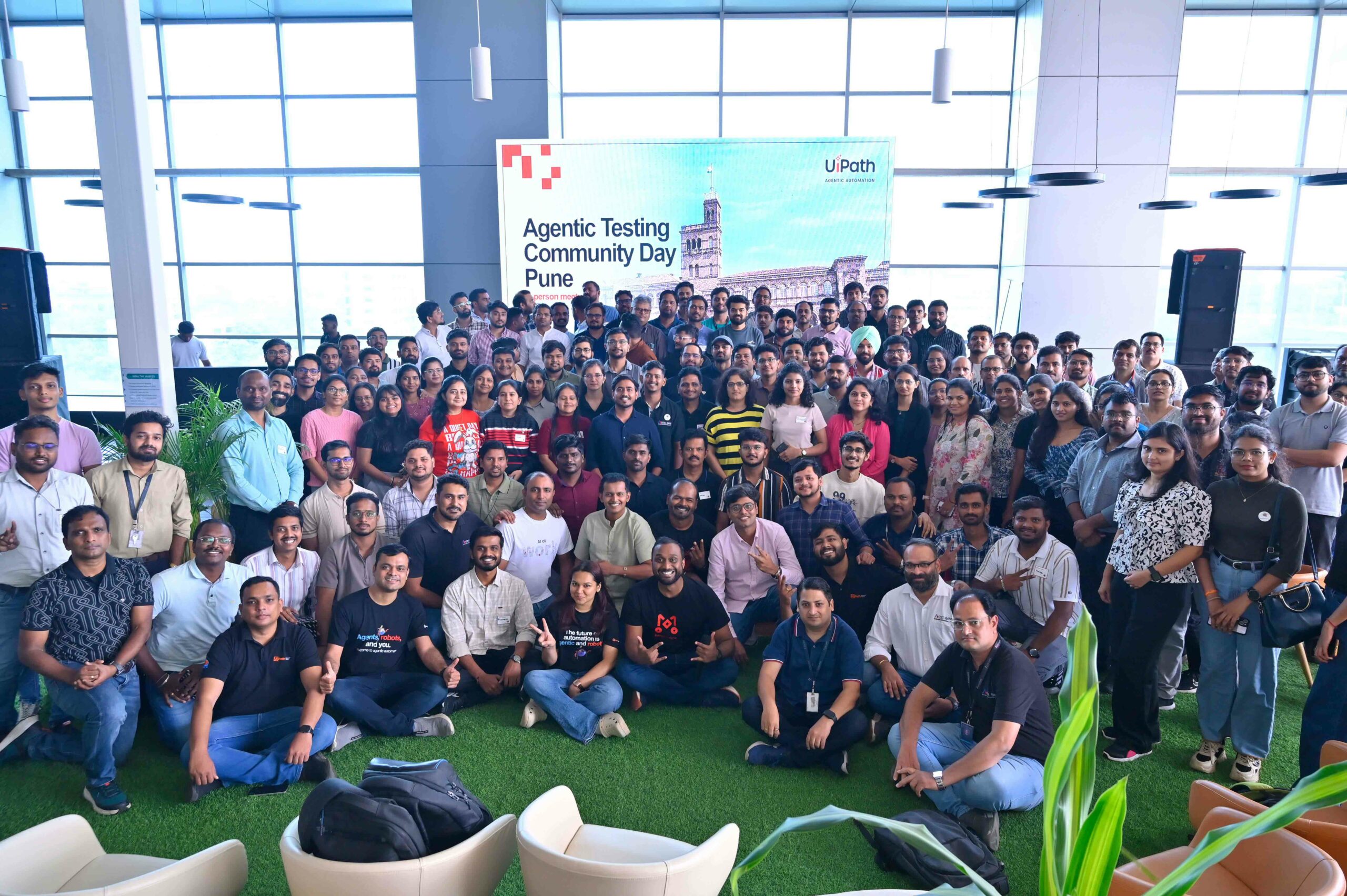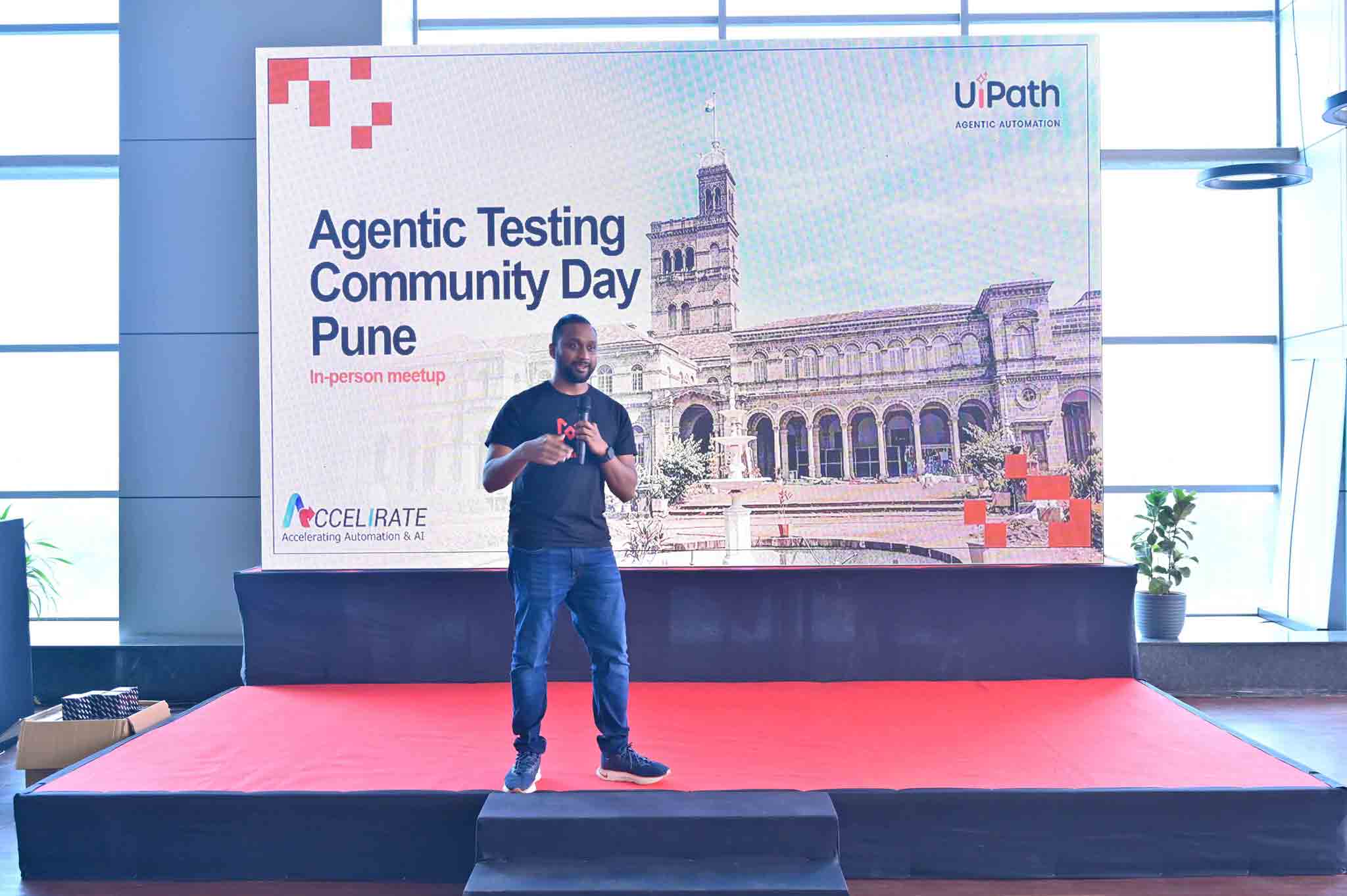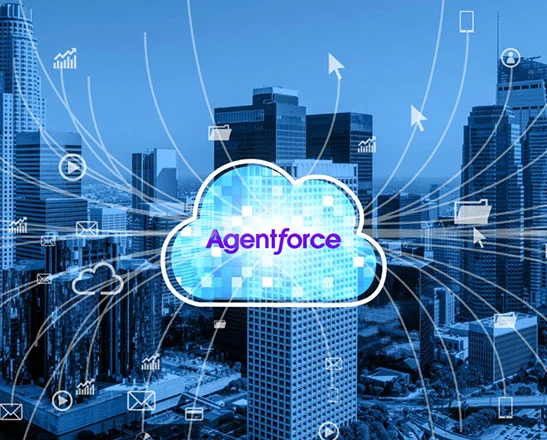Agentic Testing, Test Cloud & Autopilot: What’s New in UiPath and Why It Matters

ABSTRACT
There’s something uniquely energizing about being in a room full of people who speak the same language. People who understand the nuances of test automation, who have felt the tension of last-minute test failures, and who are genuinely excited about what’s next in intelligent automation.
That was the feeling at the UiPath Agentic Testing Community Day held in Pune, co-hosted by UiPath and Accelirate. It wasn’t just another knowledge-sharing event. It felt like a moment of anticipation, brainstorming, and innovation. A checkpoint, where testing professionals came together not just to listen or observe, but to engage, question, experiment, and reflect.
As someone who’s been in the testing space for over two decades, it is easy to become skeptical of trends that promise too much and deliver too little. But what stood out at this event wasn’t hype. It was practical progress with real demos, real conversations, and a shared understanding that test automation is at a turning point.

Why Events Like These Really Matter?
At Accelirate, our work often places us right at the intersection of automation design, testing strategy, and enterprise execution. We’re constantly evaluating what tools can actually deliver value, not just in pilot environments, but at scale.
So, to sit in a room with other leaders and practitioners who are navigating similar challenges was refreshing. It confirmed that we’re not alone in facing questions like:
- How do we scale test automation without overwhelming teams?
- How do we bring AI into testing in a meaningful and non-theoretical way?
- How can we test better in multi-system, fast-changing environments?
What made the day meaningful wasn’t just the tools or features. It was the opportunity to think critically about how testing is evolving, and how we, as QA professionals, can evolve with it.
What We Took Away: Key Sessions and Learnings
A highlight of the event was the impressive lineup of UiPath experts who shared their knowledge through impactful presentations and live demos. The topics covered included:
1. UiPath Platform Overview: A More Unified Testing Vision
The event kicked off with an insightful overview of the UiPath Platform, showcasing how UiPath is redefining enterprise automation through a unified, end-to-end solution.
The platform seamlessly integrates Robotic Process Automation (RPA), Artificial Intelligence, testing, process mining, and orchestration into one cohesive ecosystem. This powerful combination enables organizations to automate complex workflows, enhance operational efficiency, and fast-track their digital transformation goals.
What makes the UiPath Platform truly impactful is its ability to bridge people, systems, and AI-driven technologies, empowering both technical and business users to innovate collaboratively.
This session effectively positioned UiPath not just as an automation tool, but as a strategic partner for building automation-first enterprises.
2. UiPath Test Cloud: Simplifying the Complex
One of the key highlights of the event was the introduction to UiPath Test Cloud, a powerful and scalable cloud-based testing solution. Designed to simplify and accelerate test automation, UiPath Test Cloud enables teams to execute tests on-demand without the need to manage infrastructure.
This not only reduces setup time but also allows for parallel test execution at scale, making it ideal for agile and DevOps environments. Its seamless integration with UiPath Studio and Test Manager ensures traceability and visibility across the automation lifecycle.
The importance of Test Cloud lies in its ability to help QA teams deliver faster, more reliable releases while maintaining high quality, an essential step forward in modern enterprise testing strategies.
3. Mobile Testing: No Longer an Afterthought
Mobile used to be the testing team’s later problem. Something we addressed only after the desktop workflows were done. But today, mobile is often the first touchpoint for customers.
UiPath showcased how their platform supports automated testing for Android and iOS apps, enabling testers to create and run mobile tests with ease using the same low-code, AI-assisted approach found in other UiPath tools. This not only helps improve app reliability and user experience but also ensures faster release cycles.
The session emphasized that mobile testing is no longer optional; it is a critical component of end-to-end test automation strategies in modern digital ecosystems.
4. Agentic Testing Use Cases & Demos: A Glimpse into What’s Possible
If there was one session that actually sparked real curiosity and discussion, it was Agentic Testing. Through the use cases and live demos, we saw how autonomous AI agents can interpret test goals, generate and execute test cases, and even adapt based on outcomes, bringing a new level of automation, intelligence, and adaptability to QA processes.
It doesn’t mean humans are out of the loop. It means we spend less time writing brittle scripts and more time thinking strategically about what to test, why it matters, and what success really looks like. These intelligent agents help us scale smarter, not just faster.

Performance Testing and Best Practices
Too often, performance testing is an afterthought. Something we do when things start breaking under load. But this session reminded us why testing for speed, stability, and scalability needs to be embedded early.
We explored how UiPath is building performance testing into its roadmap, starting with private preview access now, with more to come. From test data realism to response time monitoring, the insights were immediately actionable.
As automation becomes more business-critical, performance is no longer optional. It’s a quality baseline.
Best practices such as early validation, using realistic test data, and ongoing performance monitoring were emphasized as foundational to ensuring robust automation. Notably, the performance testing capability is currently available in private preview and is expected to roll out more broadly soon.
Hands-on with Autopilot and Agentic Testing
Perhaps the most impactful part of the day was the hands-on time focused on UiPath Autopilot and Agentic Testing. These practical exercises allowed attendees to experience firsthand how AI-driven capabilities can simplify and accelerate automation and testing tasks.
Participants explored how Autopilot can convert plain language into automation logic and how Agentic Testing enables intelligent, self-driven test creation and execution. These challenges showcased the real-world value of these tools, making it clear that UiPath is not only advancing technology but also empowering testers and developers to work smarter and faster. The hands-on format made the learning immersive, reinforcing the potential of these innovations to shape the future of test automation.
For many attendees, this was the moment they realized: this isn’t coming next year. It’s happening now.
Where We Go from Here as QA Leaders?
In a world where AI is rapidly entering every corner of the enterprise, testing professionals need a seat at the table and the right tools to make our contributions count.
This event confirmed what we already believe at Accelirate: AI in testing isn’t about replacement, it’s about enablement. It’s about giving QA teams the power to scale, simplify, and shift from reactive testers to proactive strategists.
What stood out most wasn't the technology itself, but the mindset shift that’s happening in QA teams everywhere. From thinking of ourselves as script writers or bug catchers to becoming quality architects, people who design reliability into every system, every process, and every decision.

Prashant Deshmukh
Test Automation Manager
More Articles
How Agentic AI and Autonomous Systems Are Impacting Business Workflows?
Automation used to mean bots that just followed rigid rules. Clicking and typing only what they were told. But today’s business challenges are far more complex. That’s where Agentic AI comes in. In this thought piece, automation expert Namrata Butch shares how AI agents and autonomous systems are changing the way organizations run operations, moving beyond scripts and into systems that observe, adapt, and act.
June 16, 2025
Tableau Next Is Here: What Analysts Need to Know Now
The future of analytics is here—and it’s more collaborative than ever. Tableau Next brings Agentic AI into the analytics experience, helping analysts do more with less effort. From smarter insights powered by Tableau Semantics to helpful AI agents like Concierge and Inspector, Tableau is making data work easier, faster, and more impactful.
April 29, 2025
How to Prepare Your Salesforce Org for Agentforce AI Agents
Agentforce Agents offer powerful automation capabilities within Salesforce, but their success depends on how well your organization’s data, security, and permissions are structured.
March 17, 2025


